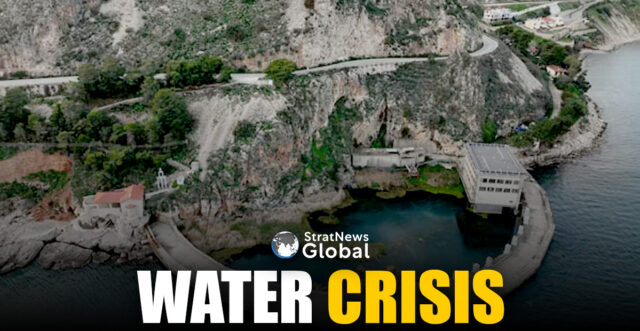In southern Greece’s Argolida region, water leaks from cracks in an irrigation canal supplying orange groves, while ageing underground pipes lose over half the pumped water, officials report.
In summer, when reservoir levels tumble, authorities in the regional capital Nafplion advise residents not to drink the contaminated brackish water that is pumped from backup sources into their homes.
“You can smell the difference in the water, feel the dryness on your clothes,” said Lydia Sarakinioti, a jeweller in Nafplion who uses bottled water even to cook.
Tackling Water Crisis
This month, the EU launched a campaign to combat a climate change-driven water crisis that it says already affects 38% of its population. It has given EU countries until next year to assess leakage levels before a legal threshold is imposed.
The programme to increase water security is expected to cost hundreds of billions of euros and comes as countries across southern Europe experience more erratic rainfall and hotter temperatures linked to climate change.
The situation in Greece, which lies on Europe’s baking southern frontier, shows just how complex and costly change will be. Last summer and winter were the warmest on record and many places saw no rainfall for months.
Water Infrastructure Crisis
Moreover, a crippling 2009-18 debt crisis has led to years of underinvestment. Greece loses around half its drinking water from leaky pipes and theft, government figures show – nearly twice the EU average of 23%. Most maps of its underground pipeline network are either not digitised or do not exist, experts and officials said.
Greece has spent more than 1.5 billion euros on drinking water infrastructure since 2019, the government said, but the southern region of Argolida, an agricultural hub that produces roughly a third of the country’s oranges, shows much more is needed.
“There are many problems, and we are trying to gradually tackle them all,” said Socrates Doris, the head of Nafplion’s municipal drinking water provider. He said that the company was seeking EU funding to help.
Prime Minister’s Promies
Prime Minister Kyriakos Mitsotakis promised to make fixes to Argolida’s water problems when he visited in November, including extending the irrigation network and providing a desalination unit to dissolve salts in water.
Government officials say fundamental fixes are needed first.
“If an area’s network leaks everywhere, what’s the point of buying a new desalination unit or drilling a well?” said Petros Varelidis, the environment ministry’s secretary general for water resources.
Leakages in some areas reach 80%, he said.
“The needs are a lot bigger than the resources available.”
Bad Water
In Argolida, water scarcity leads to poor water quality. When the lake feeding Nafplion shrinks, authorities boost it with brackish water from a submarine spring, Anavalos.
Tests commissioned by water authorities from June to November in 2022-24, seen by Reuters, showed higher than permitted levels of chlorides and sodium in those sources, which can affect people with blood pressure or kidney issues.
Nafplion is not alone. In the coastal town of Ermioni, only 8% of the 13,500 residents have permanent access to safe drinking water, according to local authorities’ data submitted to parliament.
Most residents rely on plastic bottled water, which creates its own environmental problems.
“The quality is really bad. It harms electric devices, such as the washing machine,” said resident Evi Leventi, 58.
Outside town, in fields dried by two years of drought, farmers dig up to 300 metres below the surface in search of water. It often comes up too salty because sea water has seeped into depleted underground aquifers.
“Every drop of water is indispensable… We pin our hopes on rainy winters,” said farmer George Mavras.
(With inputs from Reuters)





